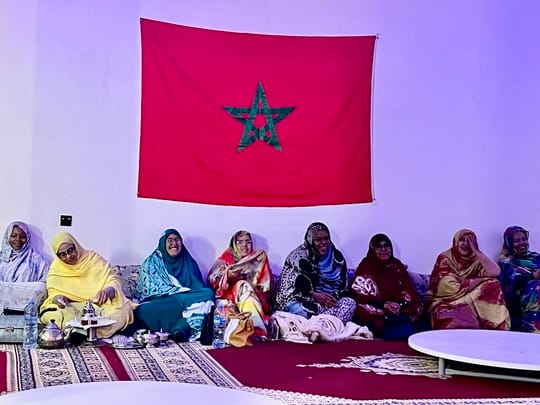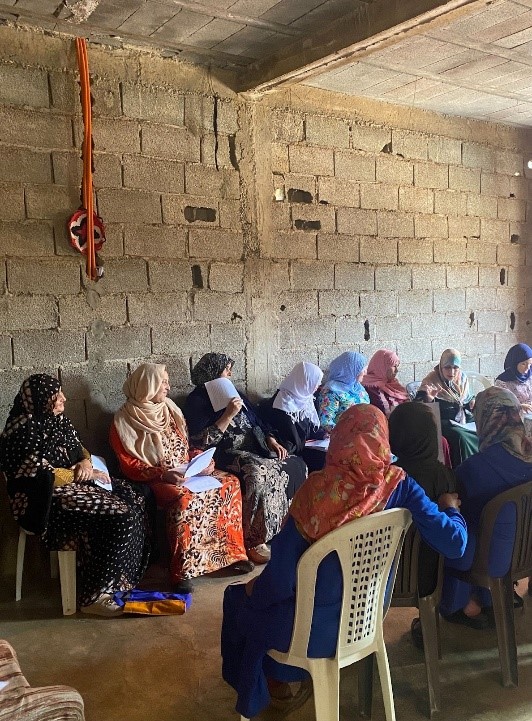Between Translation: thoughts from an IMAGINE Workshop (and a Marrakech balcony)

Livie Nute, UVA and HAF intern

Whenever I sleep outside, I feel like an infant again. There is something so nurturing, so maternal, about the night sky. The cool air swaddles me. The stars and moon tentatively poke through the dark—like a blinking monitor or a parent’s eye. The sounds of the evening have a steadier lull to them than their daytime counterparts.
Last night, street noises and sirens composed my lullaby. I have been thinking a lot about home recently. Usually this time in the summer, I am resting under the dessert sky, the river and coyotes singing me to sleep. Last night’s sleep on the Marrakech patio was no better or worse than one in the heart of a Utah canyon, just different.
As I draft this journal at the Imagine workshop, a mother’s feet rest tenderly on my chair, her toes just grazing my legs. She is nursing a little boy, no older than three months. It is almost six o’clock, they have been here all day. This baby and I, we have a lot in common, I think. He looks so confused with his surroundings, not old enough to speak, he is a silent observer. In all the confusion, all the detachment from conversation, he must trust that there is love in the room for him, that he is genuinely cared for by the women in this space, that he and the women are on the same side, and that their knowledge will protect him, with patience, and understanding when his nativity and helplessness lets on. Well, at least that’s how I feel, perhaps the baby is not as sentient. Perhaps he really is just a gummed mouth and underdeveloped brain. He is crying now. Perhaps he is too sentient, perhaps he has eyes on my laptop. Sorry baby. I hope I did not make you cry. I should give you more credit for the wisdom you possess.
I could cry too, really. This week has been so tiring, I feel like I have been birthed over and over, the world keeps making itself new to me. There is something deeply vulnerable about being in a state of confusion. Sitting through almost 40 hours of untranslated dialogue, I realize how much I like to contribute to conversation; I rely on spoken communication to build connection. Talking is a way I validate my presence; it is how I work through understanding exactly how and why I am positioned in a space. Aware that I have no idea what is going on, insecure that other people will find me out and ridicule my cluelessness, I feel like a little kid again—all I want to do is be taken seriously and sit at the adult table, though lord knows what mispronunciation will leave my mouth once I am seated. I need to take myself less seriously, accept that vulnerability is akin beautifully and inevitably to newness. Sometimes, I am bound to be the baby whose hand is held, who needs instruction on how to eat the couscous, who needs to ask for repetition of a simple phrase five times before being able to clumsily regurgitate it, who has no articulate pulse on why women next to me are crying. I struggled with that this week; I credit a lot of my intellect to emotional intelligence, so witnessing such profound emotions without any locatable understanding of their prompts was difficult. I tried writing about this feeling in my personal journal but got stuck.
Last night though, I woke on the balcony at 3:00 in the morning. It was surprisingly cold, and a single bird landed on the railing of a stoop parallel to mine. The clouds above had dispersed a bit—stars and the moon exposed, I thought of how my mom used to tuck me in, looking down upon me with the same warmth and wandering purpose as these cosmos. Thinking of the sky and maternity, I fumbled for my journal and pen, and wrote a note to myself which I have reread many times today:
“it would be easy to spin stories about why these women were crying, or what they were specifically saying with such passion this week; letting their tears simply be tears, accepting their emotion without mining for explanation, requires intention and mindfulness. Sometimes, I just must take things as they are, and let that be enough. I have to work with what I do understand—signals of sadness, grief, and release, and end the writing there.”
I guess I will end the writing there, searching for clarity and meaning in my saturated lack of understanding, but also recognizing that translation is a nuanced force. Just like the infant who has now seized crying, maybe I possess a deeper perception of this room than is acknowledged.